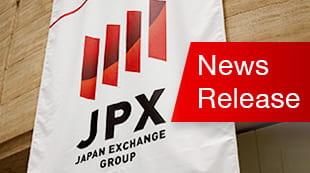Search results 7371-7380 / 10638
- sort:
- relevance
- latest

Handling of Order Quantity Restrictions for ETFs and ETNs Effective September 21, 2023 1. Parameters of order quantity restrictions for ETFs and ETNs The method of order quantity restrictions on the TSE differs depending on the type of securities, and for ETFs and ETNs, order quantity restrictions to be applied is determined according to the level of assets under management.1 After September 21, 2023, for domestic ETFs and ETNs, if the asset under management is less than 100 billion yen, the order quantity restriction will be set at the quantity equivalent to 30 billion yen. For multiply listed foreign ETFs, the order quantity restriction will also be set at the amount equivalent to 30 billion yen. For details, please refer to the table below. Type of securities Order quantity restriction parameter (the quantity of an order that is treated as error) Continuous trading market ToSTNeT market Domestic stocks (including ...

1. Data Layout (Type of Record) The symbol indicating the type of record is set in the first column of each record. Specific values are as follows. C︓Control Record H︓Header Record D︓Data Record E︓End Record (Date in Control Record) The Date in Control Record represents the application date. 2.Data Record Contents of each item # Name of Item Content Number of digits 1 Type of Record Type of Record D︓Data Record 1 2 Code Isuue Code 4 3 Number of Listed Units on arrowhead Number of Listed Units set on arrowhead 18 4 Order Quantity Restriction Flag on arrowhead Order Quantity Restriction Flag on arrowhead 1︓Listed Units * 30% 2︓30 thousand Trading Units 3︓the quantity corresponding to the order valued at JPY 300 million 1 5 Number of Units of Order Quantity Restriction on arrowhead...

USE OF PROCEEDS (i) Use of Proceeds: The net proceeds, or an amount equal to the net proceeds, of the issuance of the Notes will be used exclusively to finance or re- finance, in whole or in part, existing and/or future Eligible Projects (as defined below), by way of loans made by JFM to local governments, made at any time following the date falling 36 months prior to the Issue Date. "Eligible Projects" means sewerage projects which meet the Eligibility Criteria (as defined below). "Eligibility Criteria" means sewerage projects, for which the purposes are, the development, construction, maintenance, update or operation of sewerage-related assets that comply with Japanese laws relating to sewerage drainage standards (including the Sewerage Act (Act No. 79 of 1958, as amended), the Water Pollution Act (Act No. 138 of 1970, as amended) and the Purification Tank Act (Act No. 43 of 1983, as amended)) (...

Use of Proceeds of“Peacebuilding Bonds” The bond proceeds will be allocated to JICA's Finance and Investment Account projects in developing countries which are affected by violent conflicts. The projects will assist the targeted countries to build resilient states and societies, and contribute to realizing a peaceful and just society. JICA will manage and track the net proceeds to ensure that they are allocated only to investments in Eligible Projects excluding activities related to coal-fired power generation. The features of the Peacebuilding Bonds remain the same as previous JICA bonds, being a financial instrument that contributes to achieving the Sustainable Development Goals (SDGs), as described in the“SDGs Implementation Guiding Principles Revised Edition (2019)” set by the Japanese government. An amount equal to part or all of such net proceeds may be allocated to investments in one or more“Eligible Projects”in developing countries classified by the United ...

June 2023 Use of Proceeds The proceeds of the bonds will be allocated to JICA’s Finance and Investment Cooperation. JICA will not knowingly allocate the net proceeds of the bonds to activities related to coal-fired thermal power projects. In April 2023, JICA released a new‘JICA Social / Sustainability Bond Framework' based on the International Market Association's (ICMA) Social Bond Principles (SBP), the Green Bond Principles (GBP) and the Sustainability Bond Guidelines (SBG). JICA has obtained a second party opinion from Moody's. JICA will use the net proceeds from the sale of the bonds to finance newly committed or ongoing Eligible Projects of Sustainability Bonds as defined under the Framework. Finance and Investment Cooperation aims at promoting sustainable development of developing countries and regions through development of fundamental infrastructure such as energy, roads and railways; development of indispensable social services such as safe water, wastewater and waste ...

USE OF PROCEEDS (i) Use of Proceeds: The net proceeds, or an amount equal to the net proceeds, of the issuance of the Notes will be used exclusively to finance or re-finance, in whole or in part, existing and/or future Eligible Projects (as defined below), by way of loans made by JFM to local governments, made at any time following the date falling 36 months prior to the Issue Date. "Eligible Projects" means sewerage projects which meet the Eligibility Criteria (as defined below). "Eligibility Criteria" means sewerage projects, for which the purposes are, the development, construction, maintenance, update or operation of sewerage-related assets that comply with Japanese laws relating to sewerage drainage standards (including the Sewerage Act (Act No. 79 of 1958, as amended), the Water Pollution Act (Act No. 138 of 1970, as amended) and the Purification Tank Act (Act No. 43 of 1983, as amended)) (...

Use of Proceeds of“JICA Gender Bonds” The bond proceeds will be allocated to JICA’s Finance and Investment activities account and will be specifically used for projects where 1) the main objective is gender equality or 2) the important and deliberate objective is gender equality but not the principal reason for undertaking the project as defined by the OECD-DAC Gender Equality Policy Marker. The funds will not be knowingly allocated to any activities related to coal-fired power generation. JICA Gender Bonds’features remain the same as previous JICA bonds such as the financial instrument to contribute to achieving the Sustainable Development Goals (SDGs), which is described in the“SDGs Implementation Guiding Principles Revised Edition (2019)”set by the Japanese government. An amount equal to part or all of such net proceeds may be allocated to investments in one or more“Eligible Projects”in developing countries classified by ...

USE OF PROCEEDS (i) Use of Proceeds: The net proceeds, or an amount equal to the net proceeds, of the issuance of the Notes will be used exclusively to finance or re-finance, in whole or in part, existing and/or future Eligible Projects (as defined below), by way of loans made by JFM to local governments, made at any time following the date falling 12 months prior to the Issue Date. "Eligible Projects" means sewerage projects which meet the Eligibility Criteria (as defined below). "Eligibility Criteria" means sewerage projects, for which the purposes are, the development, construction, maintenance, update or operation of sewerage-related assets that comply with Japanese laws relating to sewerage drainage standards (including the Sewerage Act (Act No. 79 of 1958, as amended), the Water Pollution Act (Act No. 138 of 1970, as amended) and the Purification Tank Act (Act No. 43 of 1983, as amended)) (...

Use of Proceeds The bond proceeds will be allocated to JICA’s Finance and Investment Account dedicated to its ODA Loans and Private Sector Investment Finance activities. An amount equal to part or all of such net proceeds may be allocated to investments in one or more“Eligible Projects”in developing countries classified by the United Nations and the World Bank. “Eligible Projects”means projects selected under the Development Cooperation Charter, which was endorsed by the Japanese government in 2015 with the aim to proactively contribute to peace, stability and prosperity in the international community. Through each Eligible Project, JICA strives to promote socio-economic development of developing countries and address challenges to the Sustainable Development Goals (SDGs) adopted at the UN Sustainable Development Summit, with a particular focus on the below ten goals: zero hunger (Goal 2), health (Goal 3), education (Goal 4), water and sanitation (Goal 6), energy (...

Use of Proceeds The bond proceeds will be allocated to JICA’s Finance and Investment activities in Africa. An amount equal to part or all of such net proceeds may be allocated to investments in one or more“Eligible Projects”in developing countries classified by the United Nations and the World Bank. “Eligible Projects”means projects selected under the Development Cooperation Charter, which was endorsed by the Japanese government in 2015 with the aim to proactively contribute to peace, stability and prosperity in the international community. Through each Eligible Project, JICA strives to promote socio-economic development of developing countries and address challenges to the Sustainable Development Goals (SDGs) adopted at the UN Sustainable Development Summit, with a particular focus on the below ten goals: zero hunger (Goal 2), health (Goal 3), education (Goal 4), water and sanitation (Goal 6), energy (Goal 7), economic growth (Goal 8), industry and infrastructure (...














